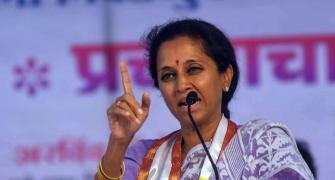 The Cabinet on Thursday endorsed the recommendations of a Group of Ministers' on a revised National Pharmaceutical Pricing Policy, giving shape to a long-pending issue.
The Cabinet on Thursday endorsed the recommendations of a Group of Ministers' on a revised National Pharmaceutical Pricing Policy, giving shape to a long-pending issue.
The government did not give out details of the decision.
According to sources, the Cabinet has imposed a cap on prices of 348 essential medicines at the arithmetic average of prices of all drugs in a particular segment with more than one per cent market share, in line with the GoM's new recommendations.
The GoM, headed by Agriculture Minister Sharad Pawar, convened a final meeting yesterday, with Finance Minister P Chidambaram as special invitee.
This was to address concerns raised by the latter's ministry on the GoM's earlier proposal.
This earlier proposal had been referred back by the cabinet secretariat after the finance ministry's objection to the market-based pricing mechanism.
At yesterday's meet, the GoM made three key changes to its earlier proposal, to bring Chidambaram on board and get the policy to the Cabinet for approval.
There was a Supreme Court deadline of November 27 hanging over the government's head; it was supposed to announce its policy before the date.
Earlier, the GoM had recommended a price cap based on the weighted average of all drugs, which would have reflected the price of expensive drugs with a better market share more than those with a lower share.
The GoM's suggestions also included a feature that any company changing the composition of the 348 essential medicines by adding a new ingredient to the formulation would come under price control and would have to seek permission from the pricing authority.
The idea is to prevent companies from circumventing price control by adding new ingredients to essential medicines.
The earlier recommendations of the GoM included only the 348 formulations under price control, while companies were free to price combinations of these drugs.
Another major recommendation of the GoM is that the price regulator would review prices of drugs periodically, instead of five years as was earlier suggested by the ministerial panel.
Sources said the Cabinet approved the proposed policy without any more changes.
Though the new policy is expected to lower the prices of various expensive drugs, there is also immense scope for a higher price of many low-cost drugs.
The new recommendations have found a mixed reception from the industry.
While some companies are relieved the government has not accepted the finance ministry's recommendations in favour of the existing cost-plus mechanism for capping prices, which was also in line with a previous SC observation, others said the simple average would impact the industry's revenues.
"Half of the industry's profit is wiped out because of the simple average formula. There are two basic objectives of the policy -- access and availability.
"While the government has achieved access through this policy, I am not sure whether all medicines would be available with this kind of policy in place," said D G Shah, secretary general, Indian Pharmaceutical Alliance, representing all top domestic pharmaceutical companies, including Ranbaxy and Cipla, which are seen to be highly impacted.
However, Lupin India's group president, Shakti Chakraborty, said, "It is a good thing that the government has chosen to adopt a market-based mechanism, thus protecting the industry interest to a large extent and also ensuring that drugs reach patients in a cost-effective manner."
So far, the government was regulating prices of medicines based on a cost-plus method, taking into account the cost of bulk drugs.
Under this, the prices of 74 bulk drugs were capped and any medicine formulation containing one or more of these or ingredients would fall under price control.
The companies were required to seek price approval for any such drug from the National Pharmaceutical Pricing Authority.
For all other medicines, drug makers were allowed to raise prices by up to 10 per cent annually; for any rise beyond this, they were required to seek permission from the regulator.
The new policy is a deviation from the existing one.
The new pricing mechanism is market-based and the ceiling price will reflect the prices determined by various companies for their different brands.









